Rye Barcott's Blog, page 4
November 30, 2020
4 Reasons to Invest in CFK WASH
CFK established its water, sanitation, and hygiene (WASH) initiatives in 2014, targeting households with expecting mothers and children under five and seeking to reduce the cases of diarrheal diseases in the community. The wide-reaching project spans our complementary programs, improving health, increasing access to quality education, and empowering girls and young women with accurate information.
In honor of Giving Tuesday 2020, we’re raising money for our WASH program, which has brought clean water and soap to approximately 1,000 households in Kibera this year. Continue reading to see why we believe in investing in WASH.
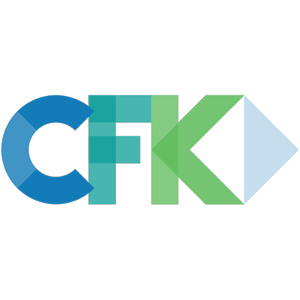
CFK WASH in Kibera
from Carolina for Kibera
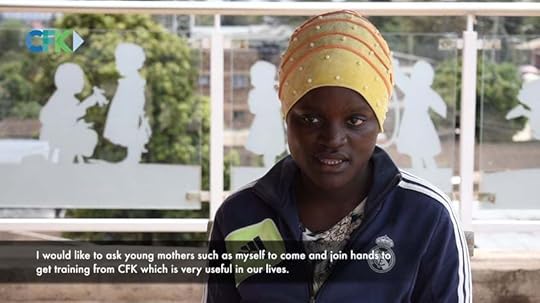
1.) It saves lives
Investing in WASH is one of the most effective ways to reduce preventable deaths. Every day, 2,195 children die from diarrheal diseases, which are the second leading cause of death for children under the age of five. Approximately 88% of these deaths are attributed to unsafe water and poor sanitation and hygiene. While WASH initiatives alone cannot completely address this tragedy, estimates indicate that diarrhea-related deaths could be cut in half if everyone washed their hands with soap and water.
Investments in WASH also help prevent the spread of foodborne illnesses, communicable diseases such as cholera, and respiratory infections such as COVID-19.
2.) It is a human right
In 2010, the United Nations recognized access to water and sanitation as human rights and classified them as “essential to the realization of all human rights.” Despite the decade-old declaration, about 2.2 billion people still lack access to safe drinking water, and more than half of the global population lacks access to safe sanitation services.
3.) It addresses various inequities
While many primarily view WASH as a health concern, access to water, sanitation, and hygiene also impacts social dynamics and economic opportunities.
For example, limited access to WASH disproportionately impacts women and girls. In Sub-Saharan Africa, women and girls are often tasked with procuring water, cooking, and cleaning for their households, leaving them less time to attend school, hold a steady job, or develop relevant skills for work outside the home. Even when girls do attend school or have a job, lack of access to appropriate hygiene can force them to miss class or work during menstruation.
Though increasing access to WASH is not a simple solution to gender inequality, investments in WASH can help address part of the socio-economic issue by allowing women and girls to pursue greater opportunities.
4.) It has a high return on investment
WASH initiatives are typically cost-effective and feasible to implement in diverse environments around the world. According to the Centers for Disease Control and Prevention, every dollar invested in WASH services generates returns ranging from $5 to $46 USD due to decreased healthcare costs and increased productivity.
Worldwide, women and girls spend 200 million hours every day collecting water. Reducing the water burden allows these individuals to invest time into other activities such as school, work, and family care, which can improve long-term health outcomes and lead to greater economic opportunities.
Support CFK’s WASH projects this #GivingTuesday, and learn more about our WASH initiatives.
Stories of Progress
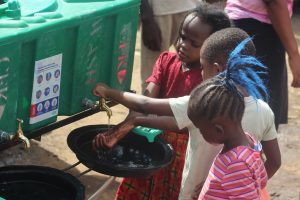 4 Reasons to Invest in CFK WASHAfter completing information and communications technology courses through CFK's entrepreneurship and economic development program, Andrew Otieno Odongo studied coding at the Moringa school and now works at a health-tech startup.by Hannah Bain
4 Reasons to Invest in CFK WASHAfter completing information and communications technology courses through CFK's entrepreneurship and economic development program, Andrew Otieno Odongo studied coding at the Moringa school and now works at a health-tech startup.by Hannah Bain
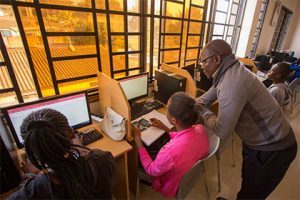 From Class to Coding: Angaza Alumnus Andrew Otieno OdongoAfter completing information and communications technology courses through CFK's entrepreneurship and economic development program, Andrew Otieno Odongo studied coding at the Moringa school and now works at a health-tech startup.by Carolina for Kibera
From Class to Coding: Angaza Alumnus Andrew Otieno OdongoAfter completing information and communications technology courses through CFK's entrepreneurship and economic development program, Andrew Otieno Odongo studied coding at the Moringa school and now works at a health-tech startup.by Carolina for Kibera
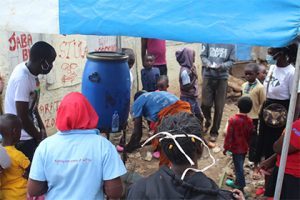 Making Handwashing More Accessible for AllWith the emergence of COVID-19, CFK increased its WASH activities by making soap and installing additional handwashing facilities throughout the community and at individual household levels. by Carolina for KiberaRead more stories
Making Handwashing More Accessible for AllWith the emergence of COVID-19, CFK increased its WASH activities by making soap and installing additional handwashing facilities throughout the community and at individual household levels. by Carolina for KiberaRead more storiesThe post 4 Reasons to Invest in CFK WASH appeared first on Carolina for Kibera.
October 29, 2020
From Class to Coding: Angaza Alumnus Andrew Otieno Odongo
By: Andrew Otieno Odongo, Community Health Outreach Program
My name is Andrew Otieno Odongo, and I am a CFK Angaza Scholarship recipient. I learned about CFK after sitting for my final primary exams when my Head Teacher told us to seek out scholarship opportunities. I had scored good marks for admission to high school, but my parents were unable to pay my fees. Still hoping to attend high school, my friends and I walked from banks to organizations that, at that time, were offering scholarship opportunities to bright but needy students. I applied for the Angaza Scholarship through CFK, was shortlisted for an interview, and was eventually selected as one of CFK’s Angaza scholars.
After completing high school, I enrolled in CFK’s Entrepreneurship and Economic Development (EED) program, which involves information technology training, training on business development, networking and mentorship opportunities, work readiness initiatives, financial literacy training, and creating a network for talent and vocational skills development through partnerships with local businesses and employers.
Through the EED program I learned soft skills in financial management, life skills, employer ability skills and business development skills. Upon finishing the soft skills preparation training, I registered for information and communications technology (ICT) classes over three months. I later passed an evaluation concerning ICT. The ICT training gave me an opportunity to connect to the Moringa School, and I secured a scholarship to further my education and study programming.

Coding Outside of the Classroom
I was shortlisted among those who qualified for the coding course at Moringa School, and I eventually obtained a certificate of completion. Currently, I am an alumnus at Moringa School and a Software Engineer Intern at Dokutela, which was bootstrapped after winning the MIT COVID -19 Hackathon.
Created for the hackathon, the team is composed of a mix of industry experts and subject matter experts from the US, India, the EU, and multiple African countries. Our vision is to create an Africa-wide healthcare platform that reduces patient risk and mortality and has capabilities throughout and after the COVID-19 pandemic. The first step in achieving this vision is creating a questionnaire and ePrescription–based platform.
Dokutela accurately and reliably triages patients with chronic illnesses using a USSD model in which patients answer a questionnaire similar to the one used by a doctor. Depending on their responses, which are relayed to our server to match with machine learning data, we notify them whether their medication is sufficient for the disease or whether a change in dosage or medicine is needed. This helps patients access healthcare facilities while maintaining social distancing norms during the COVID-19 pandemic. Dokutela intends to further extend this to other emerging global m
Learn more about CFK’s Entrepreneurship & Economic Development program.
Stories of Progress
 From Class to Coding: Angaza Alumnus Andrew Otieno OdongoAfter completing information and communications technology courses through CFK's entrepreneurship and economic development program, Andrew Otieno Odongo studied coding at the Moringa school and now works at a health-tech startup.by Hannah Bain
From Class to Coding: Angaza Alumnus Andrew Otieno OdongoAfter completing information and communications technology courses through CFK's entrepreneurship and economic development program, Andrew Otieno Odongo studied coding at the Moringa school and now works at a health-tech startup.by Hannah Bain
 Making Handwashing More Accessible for AllWith the emergence of COVID-19, CFK increased its WASH activities by making soap and installing additional handwashing facilities throughout the community and at individual household levels. by Carolina for Kibera
Making Handwashing More Accessible for AllWith the emergence of COVID-19, CFK increased its WASH activities by making soap and installing additional handwashing facilities throughout the community and at individual household levels. by Carolina for Kibera
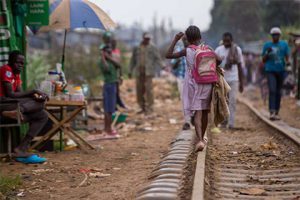 Expanding Impact While Staying True to the MissionBoard Treasurer, Francis Kibet, discusses how CFK furthered its mission while expanding its impact during 2020 and the COVID-19 pandemic. He believes that CFK's model and programs will only continue to grow.by Hannah BainRead more stories
Expanding Impact While Staying True to the MissionBoard Treasurer, Francis Kibet, discusses how CFK furthered its mission while expanding its impact during 2020 and the COVID-19 pandemic. He believes that CFK's model and programs will only continue to grow.by Hannah BainRead more storiesThe post From Class to Coding: Angaza Alumnus Andrew Otieno Odongo appeared first on Carolina for Kibera.
October 26, 2020
Making Handwashing More Accessible for All
By: Dorine Awuour, Community Health Outreach Program
Handwashing is one of the most effective ways to address preventable deaths and illnesses resulting from a range of infections. According to the Centers for Disease Control and Prevention, proper handwashing with soap and water could reduce diarrheal disease-related deaths by up to 50% and respiratory infections by 16%. In addition to its effectiveness, handwashing is an inexpensive, preventative public health measure that can be implemented in diverse areas worldwide. Each year, governments, non-governmental organizations (NGOs), and individuals gather to celebrate Global Handwashing Day on October 15 to encourage and promote effective handwashing behaviors in their communities. This year’s theme focused on inclusivity for all in handwashing, advocating for access to clean water and soap for all.
CFK’s WASH initiatives, implemented through our Community Health Outreach program, have proactively promoted handwashing behavior both in schools and the community for the past four years. With the emergence of COVID-19, the program increased its community handwashing activities by making soap and installing additional handwashing facilities throughout the community and at individual household levels.
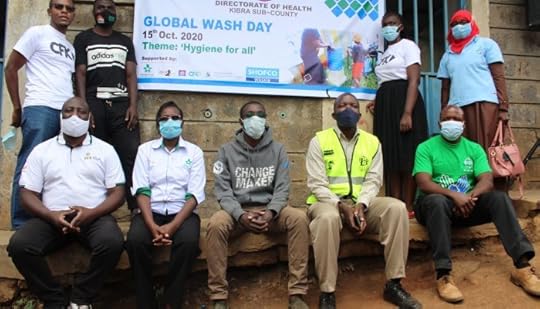
Implementing WASH Initiatives in Schools
After seven months of shut-down due to the COVID-19 pandemic, schools in Kenya slowly began to re-open in October 2020, facing various challenges related to sanitation and hygiene. In the past, informal schools in Kibera lacked handwashing facilities and struggled to promote hygiene among students, but the added threat of the coronavirus made WASH a top priority for schools.
To address the growing needs effectively, CFK’s Best Schools Initiative (BSI) conducted a survey with its partner informal schools to gauge their preparedness for school re-opening amid the pandemic. Most schools were not fully prepared, and many requested handwashing facilities. With Global Handwashing Day approaching, our Community Outreach Program staff visited two of these schools to increase awareness on the importance of hand hygiene and demonstrate the steps of proper handwashing. They also distributed three liters of soap and two, 100-liter handwashing facilities. Dedicated to providing more sustainable WASH solutions for schools, the BSI is hoping to install more handwashing facilities and teach school leaders how to make soap.
Making Handwashing Accessible for All
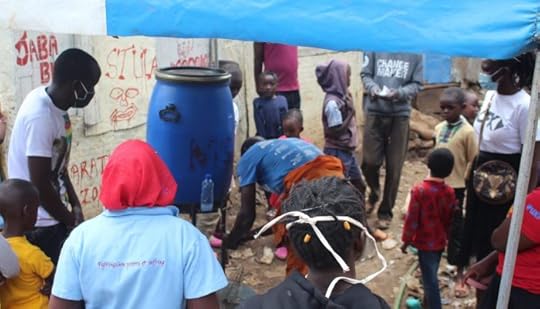
In celebration of Global Handwashing Day, CFK collaborated with various partners in Kibera and the Ministry of Health’s Public Health Officer to sensitize the community on the importance of hand hygiene. During the community activities in Lindi, we visited public handwashing stations to observe the frequency of their use and demonstrated proper handwashing techniques. Staff concluded the event by distributing 100 units of 500ml liquid soap to community members who were washing their hands at the public handwashing stations.
While Global Handwashing Day has passed this year, a new handwashing culture has emerged around the world and may disrupt traditional disease patterns moving forward. Soap and clean water are still luxuries for many living in urban informal settlements like Kibera, but greater community sensitization, investment in WASH activities, and NGO involvement can make handwashing more accessible for all.
Learn more about CFK’s COVID-19 response and work in primary health.
Stories of Progress
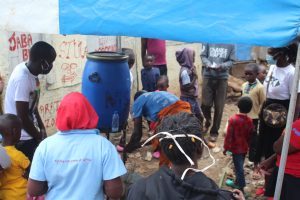 Making Handwashing More Accessible for AllWith the emergence of COVID-19, CFK increased its WASH activities by making soap and installing additional handwashing facilities throughout the community and at individual household levels. by Carolina for Kibera
Making Handwashing More Accessible for AllWith the emergence of COVID-19, CFK increased its WASH activities by making soap and installing additional handwashing facilities throughout the community and at individual household levels. by Carolina for Kibera
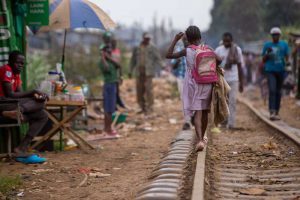 Expanding Impact While Staying True to the MissionBoard Treasurer, Francis Kibet, discusses how CFK furthered its mission while expanding its impact during 2020 and the COVID-19 pandemic. He believes that CFK's model and programs will only continue to grow.by Hannah Bain
Expanding Impact While Staying True to the MissionBoard Treasurer, Francis Kibet, discusses how CFK furthered its mission while expanding its impact during 2020 and the COVID-19 pandemic. He believes that CFK's model and programs will only continue to grow.by Hannah Bain
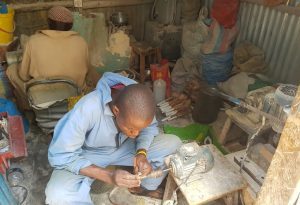 Addressing Youth Unemployment & Environmental PollutionVictorious Craft Group employs youth to turn waste into valuable products. After connecting with CFK's Entrepreneurship & Economic Development program, they were able to hire more youth and increase their impact.by Carolina for KiberaRead more stories
Addressing Youth Unemployment & Environmental PollutionVictorious Craft Group employs youth to turn waste into valuable products. After connecting with CFK's Entrepreneurship & Economic Development program, they were able to hire more youth and increase their impact.by Carolina for KiberaRead more storiesThe post Making Handwashing More Accessible for All appeared first on Carolina for Kibera.
October 20, 2020
Expanding Impact While Staying True to the Mission
Growing up in Kenya and living a portion of his life in Mathare (one of Kenya’s leading informal settlements), Francis Kibet developed an appreciation for individual impact and became committed to helping others. While living in Mathare, he remembers sharing a bathroom with 20 people and having to stand in line for the shared facility early in the morning to make it to work on time. Although he now lives in the United States, his Mathare experiences are part of who he is and helped shape his desire to make a difference in Kibera.
“There are things you learn, and they go into your head, and there are things you live, and they go into your heart,” Francis said. “It is part of who you are; it brings out the passion.”
Francis studied accounting at the University of Nairobi before moving to the United States in 2005 with his wife, Joan. While Joan continued her education, Francis obtained his MBA from the University of Eastern New Mexico. Now, he oversees technology audits in one of America’s largest utility companies headquartered in North Carolina. Though Francis is thankful for the job that he has, he recognizes there is a little more to life.
“People will most likely not remember that I was a very great auditor,” he said. “Instead, they will remember the things that I did to change another person’s life; the hours I put into CFK, the payback is invaluable.”
The Search for Service
Though Francis spent part of his life in an informal settlement near Kibera, he did not learn about CFK until he moved to the U.S. Francis first moved to New Mexico so that he and his wife could continue their education. After completing their studies, they relocated to Charlotte, North Carolina to be closer to friends. Francis didn’t hear about CFK until 2013 when a co-worker invited him to attend a book club meeting led by CFK co-founder, Rye Barcott.
“I remember leaving the meeting thinking ‘this guy was born and raised here in the U.S. and is doing something incredible in Kenya,’” Francis said. “I was very happy he was doing it, but I felt like I should part of it.”
Within a month, Francis became a CFK Board Member and now serves as Treasurer. As a Board Member, he believes his job is to promote the organization, help secure funding, and support the great team on the ground.
Serving as an auditor, Francis has worked with many non-governmental organizations (NGOs), but CFK’s community-based, participatory development approach stood out to him. Before volunteering for CFK, Francis recognized that some international organizations receiving funding from the U.S. or other overseas sources have partial understanding of the needs of their constituencies. Most of the services provided don’t meet the acute needs of the people living and working in areas like Kibera. Witnessing firsthand the inefficiencies in spending and purchasing habits of a range of international nonprofits, Francis became interested in how NGOs could more effectively target their financial support.
Though CFK is an international nonprofit, many of its staff live in Kibera, and community engagement drives the organization’s approaches. Francis found the local-based leadership of CFK interesting, and he believes that it addresses many of the financial disconnects often present in international NGOs. Francis also noted that CFK’s partnership with the CDC was unique, especially now, throughout the COVID-19 pandemic. He believes that the ethical research-based relationship allows Kibera to serve as an incubator for solutions to challenges facing informal settlements worldwide.
The Year of Focus
While 2020 has been full of unexpected challenges, it has also been a year of focus for CFK. During these difficult times, Francis said that CFK’s impact has grown even more significant.
For example, Tabitha Medical Clinic partnered with the CDC and the Kenya Ministry of Health to collect coronavirus samples and lead contact tracing efforts in Kibera. Additionally, CFK’s Executive Director, Hillary Omala, has served on six different national committees and sub-committees, contributing to the Kenya national strategy on COVID-19 response and communicating the unique challenges of containing the virus in Kibera and other informal settlements across the country.
“When you are one of the last remaining healthcare centers still operating in Kibera in the middle of the coronavirus pandemic and everybody, including the government, is looking to you for leadership…if that is not impact, then I don’t know what is.”
CFK has spent 19 years developing a model and programs that can apply to informal settlements around the world. In partnership with the CDC amid the COVID-19 pandemic, the organization has begun expanding WASH initiatives outside of Kibera. Francis looks forward to expanding CFK’s programs and impact to additional informal settlements, while also staying true to the organization’s mission.
“Our mission is to enable the local people to execute on their priorities; what is important to them. And that is what will be our North Star during these challenging times,” he concluded.
Stories of Progress
 Expanding Impact While Staying True to the MissionBoard Treasurer, Francis Kibet, discusses how CFK furthered its mission while expanding its impact during 2020 and the COVID-19 pandemic. He believes that CFK's model and programs will only continue to grow.by Hannah Bain
Expanding Impact While Staying True to the MissionBoard Treasurer, Francis Kibet, discusses how CFK furthered its mission while expanding its impact during 2020 and the COVID-19 pandemic. He believes that CFK's model and programs will only continue to grow.by Hannah Bain
 Addressing Youth Unemployment & Environmental PollutionVictorious Craft Group employs youth to turn waste into valuable products. After connecting with CFK's Entrepreneurship & Economic Development program, they were able to hire more youth and increase their impact.by Carolina for Kibera
Addressing Youth Unemployment & Environmental PollutionVictorious Craft Group employs youth to turn waste into valuable products. After connecting with CFK's Entrepreneurship & Economic Development program, they were able to hire more youth and increase their impact.by Carolina for Kibera
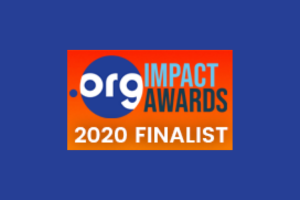 CFK Named Finalist for 2020 .ORG Impact AwardsCarolina for Kibera (CFK) is pleased to announce that we have been selected as a finalist for the 2020 .ORG Impact Awards. Winners will be announced during a 10-day event beginning November 30.by Hannah BainRead more stories
CFK Named Finalist for 2020 .ORG Impact AwardsCarolina for Kibera (CFK) is pleased to announce that we have been selected as a finalist for the 2020 .ORG Impact Awards. Winners will be announced during a 10-day event beginning November 30.by Hannah BainRead more storiesThe post Expanding Impact While Staying True to the Mission appeared first on Carolina for Kibera.
October 16, 2020
Addressing Youth Unemployment & Environmental Pollution
By: Dalton Wycliffe Odhiambo, Education & Livelihoods Program Officer, CFK
Owned and managed by young people, Victorious Craft Group community was formed in 2015 by three young men in an effort to address environmental pollution and combat the high unemployment rate among youth in Kibera. The group repurposes waste bones sourced from butcheries and slaughter houses into products such as necklaces, bracelets, earrings, hair clips, bowls, salad spoons, and tea spoons, among others. Youth receive free training on how to make and assemble the products from raw bones, and profits from the items help young people address economic challenges within their households.
Additionally, Victorious Craft Group’s workforce includes young men and women from multiple Kibera villages, enabling the group to raise awareness about responsible waste management and address issues of sustainable environmental management throughout Kibera. Thanks to support through Carolina for Kibera’s (CFK) Entrepreneurship and Economic Development (EED) program, the group’s products have a wide market, which includes the local community and wholesalers buying and selling in various markets throughout Kenya and around the world. Victorious Craft Group is now a registered business and has filed with the Government of Kenya under the Ministry of Gender and Social Services.


Connecting with CFK
After hearing about how the EED program had supported groups throughout the Kibera community, Victorious Craft Group approached CFK and learned that they could access training on information technology, business development, and financial literacy as well as networking and mentorship opportunities and work readiness initiatives to prepare youth for employment. They also discovered that the program partnered with local businesses and employers to create a network for talent and vocational skills development.
Following the initial meeting, the Victorious Craft Group scheduled time for all of its members to learn more about the program and participate in training on leadership, financial literacy, life skills, employability skills, and business development over two months. Participants were also linked to various opportunities throughout the community, including a microfinance institution. Through the connections, Victorious Craft Group took out a loan which it used to buy more grinders for its workshop. That purchase led to increased production and job creation, allowing more young people to become self-reliant individuals in the community.
Currently, the group employs 20 young people who pay their bills and often provide for their families with the income generated from selling handcrafts. According to the group’s leadership, this growth would have not been realized without the mentorship and support provided by CFK.
I invite more youth groups, community-based organizations, and individuals to organize themselves and access the opportunities being offered by CFK regardless of your gender, race, and tribe. Our ability to handle life’s challenges is a measure of our strength of character.
To connect with us, about EED opportunities, please email media@carolinaforkibera.org.
Stories of Progress
 Addressing Youth Unemployment & Environmental PollutionBy: Dalton Wycliffe Odhiambo, Education & Livelihoods Program Officer, CFK Owned and managed by young people, Victorious Craft Group community was...by Hannah Bain
Addressing Youth Unemployment & Environmental PollutionBy: Dalton Wycliffe Odhiambo, Education & Livelihoods Program Officer, CFK Owned and managed by young people, Victorious Craft Group community was...by Hannah Bain
 CFK Named Finalist for 2020 .ORG Impact AwardsCarolina for Kibera (CFK) is pleased to announce that we have been selected as a finalist for the 2020 .ORG Impact...by Hannah Bain
CFK Named Finalist for 2020 .ORG Impact AwardsCarolina for Kibera (CFK) is pleased to announce that we have been selected as a finalist for the 2020 .ORG Impact...by Hannah Bain
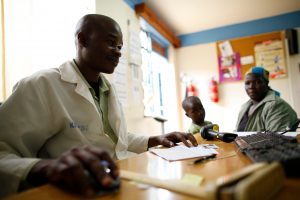 Using Data to Drive PurposeThe Story of Claire Rotich Claire Rotich grew up in Kenya and previously worked on promoting conservation methods, activism, civic...by Hannah BainRead more stories
Using Data to Drive PurposeThe Story of Claire Rotich Claire Rotich grew up in Kenya and previously worked on promoting conservation methods, activism, civic...by Hannah BainRead more storiesThe post Addressing Youth Unemployment & Environmental Pollution appeared first on Carolina for Kibera.
CFK Named Finalist for 2020 .ORG Impact Awards
Carolina for Kibera (CFK) is pleased to announce that we have been selected as a finalist for the 2020 .ORG Impact Awards. With over 500 applicants for this year’s prizes, we are honored and humbled to be in the top five nominees for the Combatting Coronavirus category and the Championing Equality, Equity, and Inclusion category.
Combatting Coronavirus
Recognizes organizations that have helped manage COVID-19 outbreaks, provided information or essential services, helped create policies to address COVID-19, or developed solutions to challenges created by the pandemic.
Since the start of the pandemic in March 2020, CFK staff have been on the frontlines addressing acute health needs, educational gaps, financial challenges, and misinformation about the virus. CFK has partnered with the Centers for Disease Control and Prevention (CDC) and Kenya Medical Research Institute to collect coronavirus samples and lead contact tracing efforts in Kibera.

Additionally, our COVID-19 response has expanded beyond the borders of Kibera. We broadened our WASH initiatives to the informal settlements of Mathare and Mukuru, helping to mitigate community-spread coronavirus cases in Kenya. Nationally, CFK Executive Director, Hillary Omala, has served on six government committees and sub-committees contributing to the national strategy on COVID-19 response and communicating the unique challenges of containing the virus in Kibera and other informal settlements across Kenya. Internationally, CFK frontline workers have been recognized as “Frontline Heroes” for their efforts to mitigate the coronavirus pandemic in Kibera.
Championing Equality, Equity, and Inclusion
Recognizes organizations for their efforts to further diversity, equality, equity, and inclusion through the creation of policies, procedures, practices, or programs.
CFK believes that adolescent girls and young mothers are critical to global progress, and we are committed to nurturing future female leaders, achieving gender equality, addressing gender-based violence, and encouraging girls to pursue educational and professional opportunities. The United Nations recognized CFK’s Binti Pamoja Centre as one of the world’s premier programs addressing the needs of adolescent girls, and our Girls Empowerment Program (GEP) provides a range of support to girls and teenage mothers in Kibera.
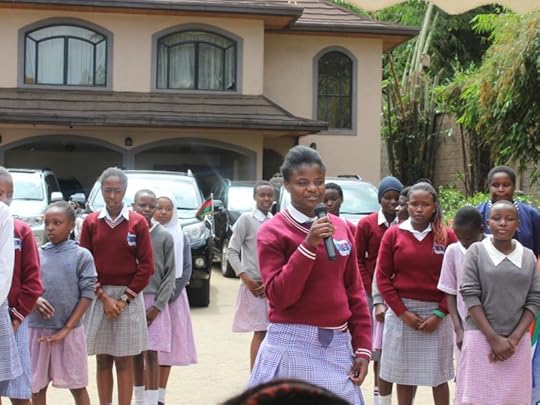
CFK’s GEP provides safe spaces where girls can connect with mentors and express themselves, educates girls on their rights, engages girls in leadership training, and provides tailored support for teenage mothers. The program also educates males on gender equality and encourages both girls and boys to become champions for gender parity in the community.
Sponsored by the Public Interest Registry, the .ORG Impact Awards will announce finalists over a 10-day, virtual award ceremony starting November 30, 2020. Stay tuned!
Learn more about our COVID-19 response and Girls Empowerment Program.
Stories of Progress
 Addressing Youth Unemployment & Environmental PollutionBy: Dalton Wycliffe Odhiambo, Education & Livelihoods Program Officer, CFK Owned and managed by young people, Victorious Craft Group community was...by Hannah Bain
Addressing Youth Unemployment & Environmental PollutionBy: Dalton Wycliffe Odhiambo, Education & Livelihoods Program Officer, CFK Owned and managed by young people, Victorious Craft Group community was...by Hannah Bain
 CFK Named Finalist for 2020 .ORG Impact AwardsCarolina for Kibera (CFK) is pleased to announce that we have been selected as a finalist for the 2020 .ORG Impact...by Hannah Bain
CFK Named Finalist for 2020 .ORG Impact AwardsCarolina for Kibera (CFK) is pleased to announce that we have been selected as a finalist for the 2020 .ORG Impact...by Hannah Bain
 Using Data to Drive PurposeThe Story of Claire Rotich Claire Rotich grew up in Kenya and previously worked on promoting conservation methods, activism, civic...by Hannah BainRead more stories
Using Data to Drive PurposeThe Story of Claire Rotich Claire Rotich grew up in Kenya and previously worked on promoting conservation methods, activism, civic...by Hannah BainRead more storiesThe post CFK Named Finalist for 2020 .ORG Impact Awards appeared first on Carolina for Kibera.
October 12, 2020
Using Data to Drive Purpose
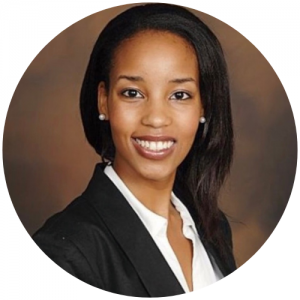
Claire Rotich grew up in Kenya and previously worked on promoting conservation methods, activism, civic engagement, and social justice in Kibera. She learned about CFK after moving to North Carolina and re-connecting with an old friend.
After attending the Imperial College of London for her undergraduate degree in biomedical engineering, Claire moved to North Carolina to pursue graduate degrees in global public health and clinical informatics at Duke University. Motivated by a desire to improve access to high-quality healthcare using an interdisciplinary approach informed by context and enabled by data, analytics and technology. She met her husband at Duke and decided to stay in North Carolina after completing her degrees.
Claire, who works as a data analytics consultant in the healthcare industry, has always explored opportunities to connect her passions: health equity, youth empowerment, data and analytics, and, her homeland Kenya. She learned about CFK’s mission, through a conversation with Francis Kibet, a family friend and CFK’s current Board Treasurer who also resides in North Carolina. The conversation sparked Claire’s interest, and her desire to learn more only intensified after reading It Happened on the Way to War, a memoir by CFK co-founder Rye Barcott that chronicles CFK’s origins. The book, and, a follow up conversation with Executive Director, Hillary Omala about the programs CFK was running with the community resonated with her. A few months later, she began serving on CFK’s Board of Directors.
“I liked that CFK was driven by the community, for the community from the very beginning by the late Tabitha Festo,” Claire said. “The organization has worked hard to earn community trust, and I respect that greatly.”
Serving on the Board throughout the COVID-19 pandemic, Claire has witnessed firsthand the essentiality of strong, local leadership. She has been impressed by Executive Director Hillary Omala’s efforts to protect the staff and community throughout the coronavirus pandemic, and she believes that his engagement with national strategy teams is a testament to the strength of CFK’s leadership.
Using Data to Drive Purpose
With a scientific, data-driven background, Claire advocates for CFK’s commitment to using evidence-based methods to inform, strengthen, and center interventions.
“The organization’s Best Schools Initiative (BSI) is a very interesting example of using data to drive purposed interventions,” Claire said. “Hopefully, the program will make education more accessible and help move children out of the circle of poverty.”
Led by Education and Livelihoods Program Coordinator, Jeffrey Okoro, the BSI is a data-driven initiative focused on improving student attendance and success in Kibera’s informal schools. Based on a participatory development model, the initiative has worked with the community to identify barriers to student success and develop tailored interventions to address them. The BSI is currently testing and evaluating the impact of its interventions to determine which ones most effectively improve student attendance and success.
Long-term sustainability & expansion
The first time Claire met with Rye, they talked about the future of CFK and what it would look like for the organization to achieve its mission. After serving on the Board of Directors for over a year, Claire believes that CFK has the potential to expand its strategies and programs to additional informal settlement communities and provide a replicable framework for organizations working in similar areas around the world.
“CFK’s ultimate success would be to not be required in the community anymore,” Claire said. “We want to see interventions and facilities such as Tabitha Medical Clinic and the BSI become embedded into the community, organically replicated and sustained by the community so they are not reliant on external donations or grant funding. To do that, we need to build an economy within CFK programs that supports, expands, and withstands the economic shocks that affect the rest of the country. CFK’s evidence-based methods inform, strengthen and center on interventions that support this long term vision ”
Learn more about CFK’s research platform and the BSI.
Stories of Progress
 Using Data to Drive PurposeThe Story of Claire Rotich Claire Rotich grew up in Kenya and previously worked on promoting conservation methods, activism, civic...by Hannah Bain
Using Data to Drive PurposeThe Story of Claire Rotich Claire Rotich grew up in Kenya and previously worked on promoting conservation methods, activism, civic...by Hannah Bain
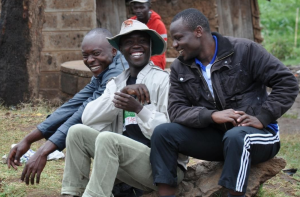 Emphasizing the Importance of Mental HealthThe Story of Elmard Rigan Elmard Rigan, known by his friends as Rigan, has always been interested in understanding how...by Hannah Bain
Emphasizing the Importance of Mental HealthThe Story of Elmard Rigan Elmard Rigan, known by his friends as Rigan, has always been interested in understanding how...by Hannah Bain
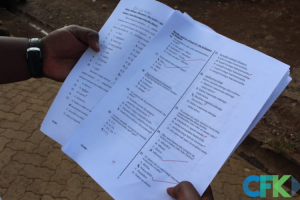 Angaza Alumni Support Home Learning Initiatives During COVID-19By Joshua Omweno, Program Officer - Angaza Scholarship Program COVID-19 and Educational Inequalities The global lockdown of education institutions has...by Carolina for KiberaRead more stories
Angaza Alumni Support Home Learning Initiatives During COVID-19By Joshua Omweno, Program Officer - Angaza Scholarship Program COVID-19 and Educational Inequalities The global lockdown of education institutions has...by Carolina for KiberaRead more storiesThe post Using Data to Drive Purpose appeared first on Carolina for Kibera.
October 9, 2020
Emphasizing the Importance of Mental Health

Elmard Rigan, known by his friends as Rigan, has always been interested in understanding how people think. Growing up in Kibera, he witnessed how poverty and inequality posed challenges for both physical and mental health, especially among vulnerable youth populations. Though physical and mental health are interrelated, Rigan frequently observed residents seek help for physical ailments while struggling silently with mental health and neurological disorders such as depression, anxiety, developmental disorders, or post-traumatic stress disorder (PTSD).
Determined to address unmet needs in his community, Rigan studied counseling and psychology at the University of Nairobi in Kenya and eventually returned to Kibera, where he found work with Carolina for Kibera (CFK). Rigan first joined CFK as a volunteer in 2016, but, after just three (3) months, the organization hired him as one of its first psychological counselors. In 2018, Rigan continued exploring the links between physical and mental health by also assuming the role of an HIV testing services provider.
“I have always called Kibera home, and I feel like my journey has prepared me for the work that I do now,” said Psychological Counselor Elmard Rigan. “I know the challenges and problems present in the community, and I understand the way that people think.”
Advocating for more Holistic Healthcare
Though he works as a part of CFK’s Education and Livelihoods and Youth Friendly Services (YFS) team, Rigan offers counseling services and HIV testing services to consenting clients across CFK’s programs. One day, he may be counseling teenagers about sexual and reproductive health. The next, he may be offering psychological support services to an adult who recently tested positive for HIV.
“Physical and mental health are not completely separate,” Rigan noted. “To support people effectively, we have to consider the many factors that impact their holistic health and provide more comprehensive care.”
For example, though cerebral palsy is primarily considered an issue of motor impairment and physical health, individuals diagnosed with the disorder are at a higher risk of facing mental health challenges such as depression or anxiety. Despite this, mental health is often overlooked or misinterpreted in the management of cerebral palsy.
On one occasion, Rigan worked with a child suffering from psychological issues due to cerebral palsy. Understanding the importance of treating both physical and mental health, Rigan immediately connected the child’s family to government programs and a mental health facility. CFK also connected the child’s single mother to a job opportunity, allowing her to afford long-term, critical care for her child.
Mental Health During COVID-19
While the coronavirus is a respiratory illness that poses serious threats to physical health, it has also adversely impacted mental health around the world. Mandatory curfews and quarantine, the loss of jobs, and the closure of schools and gathering places due to the COVID-19 pandemic have heightened stress levels and limited personal connections, resulting in an increase in anxiety and depression.
Working primarily with the youth in Kibera, Rigan has also noticed an increase in teenage pregnancy, rape, and sexual and gender-based violence (SGBV) since the start of the coronavirus pandemic and the closure of schools, which often serve as safe spaces for youth in the community.
“Students are out of school, and it is now more important than ever to talk to them about their health and have conversations about how to stay safe,” Rigan said. “We lead conversations like this at the Youth Friendly Centre (YFC) because we want youth to be able to make informed decisions about their physical and mental health.”
Addressing the Stigma Surrounding Mental Health
While discussions about mental health are becoming more common, Rigan noted that a gap still remains because of the few resources and deep-rooted cultural norms that equate mental health struggles with “demons.”
“Even when mental health services exist, it can be difficult to encourage people to access them,” Rigan added. “Many still do not recognize mental health as an acute issue, and many more do not access services because they do not want their neighbors to think that they have demons.”
In conjunction with youth-friendly services such as sexual reproductive health and mentorship, CFK’s Young Health and Wellness Centre has offered psychological counseling and led discussions about mental health with the youth in Kibera since opening in 2019.
CFK’s Girls’ Empowerment Program (GEP) has also touched on mental health by providing adolescent girls and teenage mothers with spaces where they are physically, emotionally, and psychologically safe to share their experiences and find support. In partnership with the Adelle Onyango Initiative, the GEP’s newest project, Safe 24/7, further explores the topic of mental health by helping to build resilience and coping strategies among survivors of sexual abuse and SGBV
By integrating mental health services and discussions into existing CFK programs, Rigan hopes to help debunk myths and address stigma surrounding the topic.
“We have a long way to go concerning discussions about mental health, but we are making progress,” concluded Rigan.
Learn more about the mental health resources available at CFK, and engage in discussions about mental health during this year’s #WorldMentalHealthDay.
Stories of Progress
 Emphasizing the Importance of Mental HealthThe Story of Elmard Rigan Elmard Rigan, known by his friends as Rigan, has always been interested in understanding how...by Hannah Bain
Emphasizing the Importance of Mental HealthThe Story of Elmard Rigan Elmard Rigan, known by his friends as Rigan, has always been interested in understanding how...by Hannah Bain
 Angaza Alumni Support Home Learning Initiatives During COVID-19By Joshua Omweno, Program Officer - Angaza Scholarship Program COVID-19 and Educational Inequalities The global lockdown of education institutions has...by Carolina for Kibera
Angaza Alumni Support Home Learning Initiatives During COVID-19By Joshua Omweno, Program Officer - Angaza Scholarship Program COVID-19 and Educational Inequalities The global lockdown of education institutions has...by Carolina for Kibera
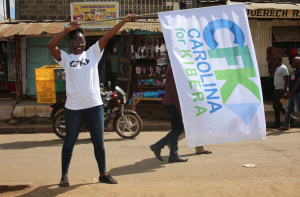 Tabitha Maternity Home: Celebrating One Year of Service in KiberaCarolina for Kibera’s (CFK) Tabitha Maternity Home celebrated its one-year anniversary on September 23, 2020. Opened in response to community...by Hannah BainRead more stories
Tabitha Maternity Home: Celebrating One Year of Service in KiberaCarolina for Kibera’s (CFK) Tabitha Maternity Home celebrated its one-year anniversary on September 23, 2020. Opened in response to community...by Hannah BainRead more storiesThe post Emphasizing the Importance of Mental Health appeared first on Carolina for Kibera.
October 5, 2020
Angaza Alumni Support Home Learning Initiatives During COVID-19
By Joshua Omweno, Program Officer – Angaza Scholarship Program
COVID-19 and Educational Inequalities
The global lockdown of education institutions has caused major, and likely unequal, interruptions in students’ learning, including disruptions in internal assessments and the cancellation or replacement of major student exams. Attending and staying in school raises skills among students and increases opportunities available to them post-graduation. Yet, even a relatively short period of missed school has significant consequences on student success. The COVID-19 pandemic has caused much more than a short period of disruption and, without creative solutions, it may impede many students in Kibera from returning to class or qualifying for secondary school.
Though students are facing many challenges through this public health emergency, Carolina for Kibera’s (CFK) Angaza program has supported their abilities to continue learning at home, even if they do not have access to an internet connection. By distributing revision packets, sharing online resources, and monitoring student progress through phone calls, texts, and WhatsApp messages, staff and alumni are ensuring that students are prepared to return to class when schools re-open.
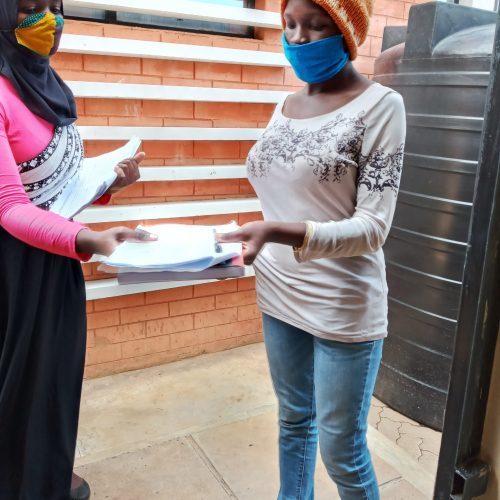 An Angaza alumna provides revision materials to a current student.
An Angaza alumna provides revision materials to a current student.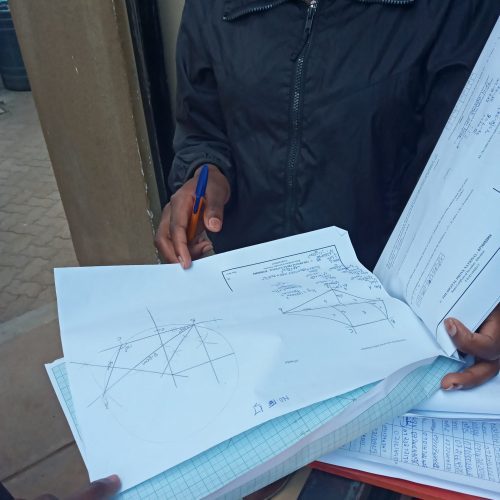 Revision materials provided by the Angaza program.
Revision materials provided by the Angaza program.Angaza Alumni Give Back
Past program beneficiaries are a special breed of people with relevant experience to support and mentor current students in the pursuit of attaining academic excellence. These ambitious, young alumni are assets in the community and have resounding hope and remarkable creativity. They have the talent and initiative to create real, sustainable change, despite living in a challenging environment, and this remains especially true throughout the COVID-19 pandemic.
Currently, the Angaza program supports 77 students with scholarships and engages many other students across Kibera’s 13 villages. To support such a large and widespread population during this period, the program has drawn on its network of alumni, who have provided extensive support in reaching out to current beneficiaries. Eight program alumni have dedicated their time, four hours a day on average, to support CFK’s home learning strategy, which focuses on key subjects (Mathematics, Sciences and Languages).
Angaza’s two main goals during the COVID-19 pandemic have been clear from the onset of school closures: cover syllabus topics on term 1 and 2 and cultivate a reading culture among students to keep them engaged in learning.
To ensure effectiveness, the program has:
Delegated supervisory roles to alumni based on village of residence and subject strength.
Assigned the alumni a sizable number of students that can be managed effectively with weekly spot checks to check on student progress.
Focused on tackling topical questions weekly using existing revision resources.
Through the support of Angaza’s alumni, the program has distributed more than 10,000 revision materials to 607 students, both direct and indirect beneficiaries, to date. Though they have reached many already, staff and alumni strongly believe there is still more to be done.
Learn more about the Angaza program and make a donation to support home learning during COVID-19.
Stories of Progress
 Angaza Alumni Support Home Learning Initiatives During COVID-19By Joshua Omweno, Program Officer - Angaza Scholarship Program COVID-19 and Educational Inequalities The global lockdown of education institutions has...by Hannah Bain
Angaza Alumni Support Home Learning Initiatives During COVID-19By Joshua Omweno, Program Officer - Angaza Scholarship Program COVID-19 and Educational Inequalities The global lockdown of education institutions has...by Hannah Bain
 Tabitha Maternity Home: Celebrating One Year of Service in KiberaCarolina for Kibera’s (CFK) Tabitha Maternity Home celebrated its one-year anniversary on September 23, 2020. Opened in response to community...by Hannah Bain
Tabitha Maternity Home: Celebrating One Year of Service in KiberaCarolina for Kibera’s (CFK) Tabitha Maternity Home celebrated its one-year anniversary on September 23, 2020. Opened in response to community...by Hannah Bain
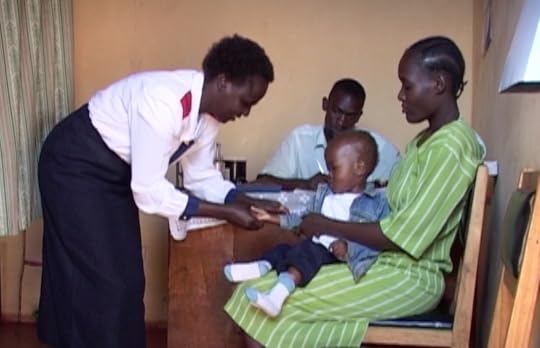 Sacrificing for Success: A Tribute to Tabitha FestoTabitha's Story With $26, a personal sacrifice, and a fierce commitment to serving her community, Tabitha Atieno Festo laid the foundation...by Hannah BainRead more stories
Sacrificing for Success: A Tribute to Tabitha FestoTabitha's Story With $26, a personal sacrifice, and a fierce commitment to serving her community, Tabitha Atieno Festo laid the foundation...by Hannah BainRead more storiesThe post Angaza Alumni Support Home Learning Initiatives During COVID-19 appeared first on Carolina for Kibera.
September 25, 2020
Tabitha Maternity Home: Celebrating One Year of Service in Kibera
Carolina for Kibera’s (CFK) Tabitha Maternity Home celebrated its one-year anniversary on September 23, 2020. Opened in response to community need and with community feedback, the maternity home seeks to improve maternal and child health outcomes in Kibera. Though the maternal mortality rate in Kenya has been declining, it is still approximately 62% higher than the global average, and women living in informal settlements are even more vulnerable to the risks associated with pregnancy and childbirth.
Like CFK’s Tabitha Medical Clinic, the maternity home is named after the late CFK co-founder and Kiberan nurse, Tabitha Festo, who established the organization’s first clinic with just $26 U.S. dollars and had a dream of serving the healthcare needs of women and children.
“There is satisfaction in serving over 60,000 people every year with comprehensive healthcare services, but there is greater satisfaction in realizing that this was born out of $26 and a compassionate dream,” said CFK Executive Director, Hillary Omala.
To date, the facility has served 2,248 patients, 660 of whom are maternity patients, and staff have facilitated the delivery of 416 babies. In addition to providing antenatal care, delivery, and education during pregnancy and childbirth, the Tabitha Maternity Home also supports mothers with healthcare resources for the first 1,000 days of their child’s development.
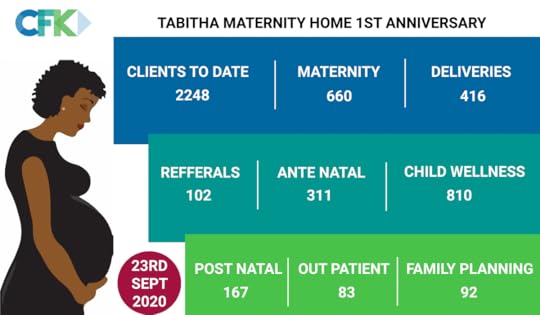
CFK celebrated the maternity home’s first anniversary with a community event, which culminated in the presentation of the organization’s first-ever ambulance. The ambulance will allow CFK to provide affordable, potentially life-saving, emergency transportation to residents in Kibera.
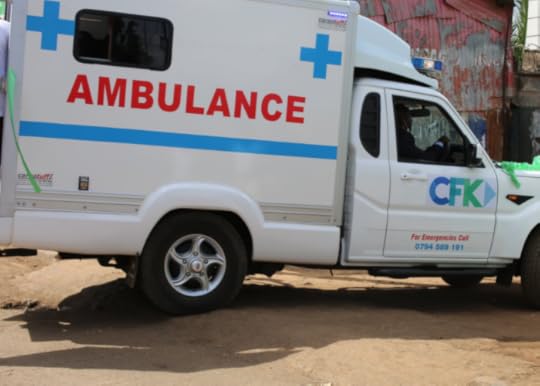
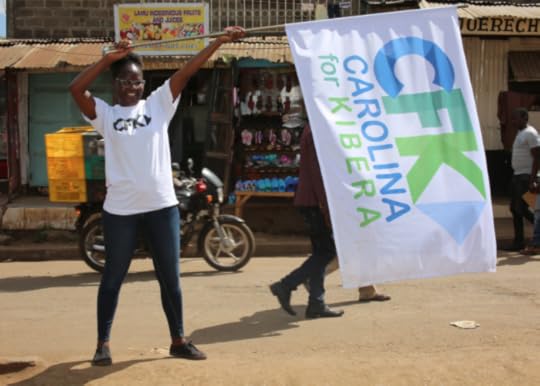
The event also included a range of activities hosted by CFK staff, including a skit highlighting the services available at the facility. Ruth, a midwife at the maternity home, presented a poem titled “Circle of Push,” which discussed the process leading up to the birth of a child. In celebration, CFK also shared gifts including food, water containers, baby products, and bags to some of the first mothers and children served at the maternity home. Staff ended the proceedings by taking a ride through Kibera in the ambulance, advertising the affordable services available at the Tabitha Maternity Home.
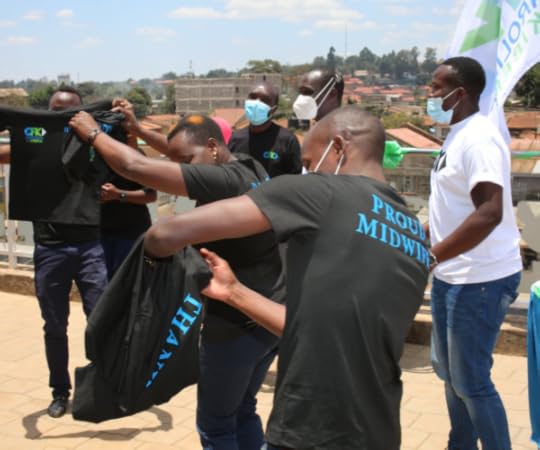

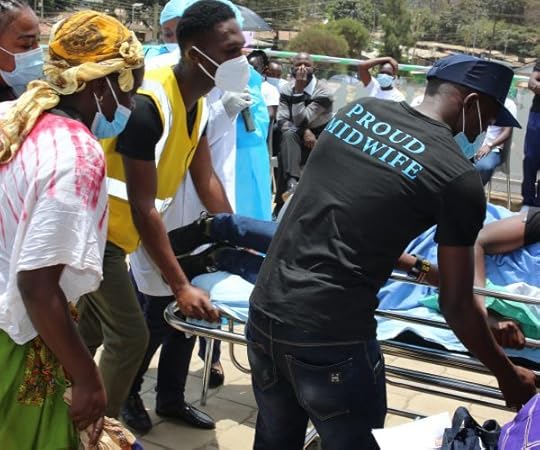
The future of maternal and child health in Kibera and surrounding areas is brighter thanks to the Tabitha Maternity Home and CFK’s new ambulance.
“The work of CFK has made a significant difference in people’s lives in Kibera. Now we know the kind of difference we want to make in the future,” said Hillary.
Learn more about CFK’s Tabitha Maternity Home.
Stories of Progress
 Tabitha Maternity Home: Celebrating One Year of Service in KiberaCarolina for Kibera’s (CFK) Tabitha Maternity Home celebrated its one-year anniversary on September 23, 2020. Opened in response to community...by Hannah Bain
Tabitha Maternity Home: Celebrating One Year of Service in KiberaCarolina for Kibera’s (CFK) Tabitha Maternity Home celebrated its one-year anniversary on September 23, 2020. Opened in response to community...by Hannah Bain
 Sacrificing for Success: A Tribute to Tabitha FestoTabitha's Story With $26, a personal sacrifice, and a fierce commitment to serving her community, Tabitha Atieno Festo laid the foundation...by Hannah Bain
Sacrificing for Success: A Tribute to Tabitha FestoTabitha's Story With $26, a personal sacrifice, and a fierce commitment to serving her community, Tabitha Atieno Festo laid the foundation...by Hannah Bain
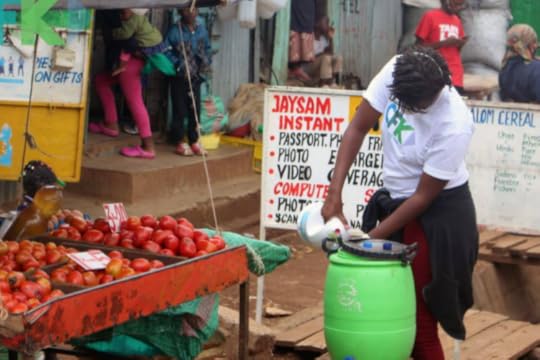 Staff Highlight: Championing Affordable Access to Quality HealthcareThe Story of Joy Barnice Henry As the daughter of CFK’s co-founder, Tabitha Festo, Joy Barnice Henry feels like she...by Hannah BainRead more stories
Staff Highlight: Championing Affordable Access to Quality HealthcareThe Story of Joy Barnice Henry As the daughter of CFK’s co-founder, Tabitha Festo, Joy Barnice Henry feels like she...by Hannah BainRead more storiesThe post Tabitha Maternity Home: Celebrating One Year of Service in Kibera appeared first on Carolina for Kibera.
Rye Barcott's Blog
- Rye Barcott's profile
- 7 followers



